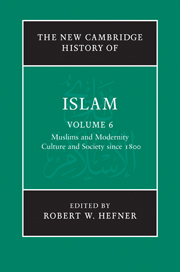Book contents
- Frontmatter
- 1 Introduction: Muslims and modernity: culture and society in an age of contest and plurality
- PART I SOCIAL TRANSFORMATIONS
- 2 New networks and new knowledge: migrations, communications and the refiguration of the Muslim community in the nineteenth and early twentieth centuries
- 3 Population, urbanisation and the dialectics of globalisation
- 4 The origins and early development of Islamic reform
- 5 Reform and modernism in the middle twentieth century
- 6 Islamic resurgence and its aftermath
- 7 The new transnationalism: globalising Islamic movements
- 8 Muslims in the West: Europe
- 9 Muslims in the West: North America
- 10 New frontiers and conversion
- PART II RELIGION AND LAW
- PART III POLITICAL AND ECONOMIC THOUGHT
- PART IV CULTURES, ARTS AND LEARNING
- Glossary
- Bibliography
- Index
- References
3 - Population, urbanisation and the dialectics of globalisation
from PART I - SOCIAL TRANSFORMATIONS
Published online by Cambridge University Press: 28 March 2011
- Frontmatter
- 1 Introduction: Muslims and modernity: culture and society in an age of contest and plurality
- PART I SOCIAL TRANSFORMATIONS
- 2 New networks and new knowledge: migrations, communications and the refiguration of the Muslim community in the nineteenth and early twentieth centuries
- 3 Population, urbanisation and the dialectics of globalisation
- 4 The origins and early development of Islamic reform
- 5 Reform and modernism in the middle twentieth century
- 6 Islamic resurgence and its aftermath
- 7 The new transnationalism: globalising Islamic movements
- 8 Muslims in the West: Europe
- 9 Muslims in the West: North America
- 10 New frontiers and conversion
- PART II RELIGION AND LAW
- PART III POLITICAL AND ECONOMIC THOUGHT
- PART IV CULTURES, ARTS AND LEARNING
- Glossary
- Bibliography
- Index
- References
Summary
Introduction
In the nineteenth and early twentieth centuries European colonialism created the infrastructure for a new and more global system of economic production and exchange. In the aftermath of the Second World War, colonial capitalism gave way to less directly coercive linkages of market and state, but events have otherwise preserved a general pattern of Western economic dominance.
This chapter examines the impact of the phases of economic globalisation and Western dominance since the late nineteenth century on urbanisation, industrialisation and inequality in the Muslim world. It also examines how mainstream Islam is responding to the challenges of globalisation. Special attention is given to the colonial legacies of population, urban growth and class inequalities; the implications of globalisation and international economic restructuration during the 1980s and 1990s; contrasts between oil-producing and non-oil Muslim economies and alleged affinities between the rentier state and political authoritarianism; the new alliance between Islamic financiers, the ʿulamāʾ and global capitalism; and the impact of today’s ‘demographic bulge’ on future trends in population and politics.
Colonial legacies
The development of the telegraph, coupled with the opening of the Suez Canal in 1869, ushered in the first phase of economic globalisation, 1870–1914. Movements of peoples, goods, capital and information accelerated across the globe, and the governments of the principal owners of the capital and technology in turn extended their empires for the sake of increased efficiency and to defend themselves from one another.
- Type
- Chapter
- Information
- The New Cambridge History of Islam , pp. 69 - 106Publisher: Cambridge University PressPrint publication year: 2010

